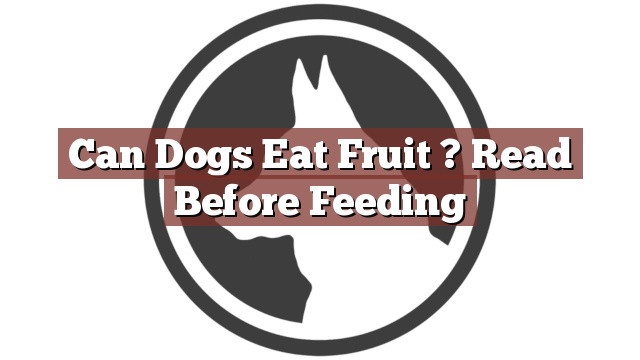Understanding Your Dog’s Dietary Needs
As a responsible pet owner, it is essential to understand your dog’s dietary needs to ensure their overall well-being. Dogs are omnivores, meaning they can eat both meat and plant-based foods. While their main diet should consist of high-quality dog food formulated to meet their specific nutritional requirements, it is natural for dog owners to wonder if their furry friends can eat fruits as well.
Can Dogs Eat Fruit? Read Before Feeding
Can dogs eat fruit? This is a common question among dog owners. The answer is yes. Many fruits can be a healthy addition to your dog’s diet, as they provide essential vitamins, minerals, and fiber. However, it is crucial to be mindful of the types of fruits and the quantities you feed your dog.
Some fruits that are safe and beneficial for dogs include apples, bananas, blueberries, watermelon, and strawberries. These fruits are low in calories and high in nutrients. They can be given as treats or added to your dog’s regular meals in moderation. However, it is important to remove any seeds, pits, or stems before feeding the fruit to your dog, as they can be harmful or pose a choking hazard.
Pros and Cons of Feeding Fruit to Your Dog
Feeding fruit to your dog has its pros and cons. On the positive side, fruits are a great source of vitamins and antioxidants that can boost your dog’s immune system and promote overall health. The natural sugars present in fruits provide a tasty alternative to commercial dog treats, making them a healthier option for rewarding your furry friend.
However, it is important to consider the cons as well. Some fruits, such as grapes and raisins, can be toxic to dogs and should never be fed to them. These fruits can cause kidney failure and lead to serious health issues. Additionally, fruits are generally higher in sugar compared to vegetables, so if your dog has diabetes or a sensitive stomach, it is best to consult with your veterinarian before introducing fruits into their diet.
Conclusion: Considerations for Fruit in Your Dog’s Diet
In conclusion, fruits can be a nutritious and delicious addition to your dog’s diet. However, it is essential to be informed and cautious about the fruits you feed them. Stick to safe options like apples, bananas, berries, and watermelon, and always remove any seeds, pits, or stems. Remember, moderation is key, and fruits should only make up a small portion of your dog’s overall diet.
If you have any concerns about your dog’s diet or are unsure about feeding them certain fruits, it is always best to consult with your veterinarian. They can provide specific guidance based on your dog’s individual needs and help you make informed decisions about their diet. By understanding your dog’s dietary needs and making the right choices, you can ensure that they stay happy and healthy for years to come.
Thank you for taking the time to read through our exploration of [page_title]. As every dog lover knows, our furry friends have unique dietary needs and responses, often varying from one canine to another. This is why it's paramount to approach any changes in their diet with caution and knowledge.
Before introducing any new treats or making alterations to your dog's diet based on our insights, it's crucial to consult with a veterinarian about [page_title]. Their expertise ensures that the choices you make are well-suited to your particular pet's health and well-being.
Even seemingly harmless foods can sometimes lead to allergic reactions or digestive issues, which is why monitoring your dog after introducing any new food item is essential.
The content provided here on [page_title] is crafted with care, thorough research, and a genuine love for dogs. Nevertheless, it serves as a general guideline and should not be considered a substitute for professional veterinary advice.
Always prioritize the expert insights of your veterinarian, and remember that the health and happiness of your furry companion come first.
May your journey with your pet continue to be filled with joy, love, and safe culinary adventures. Happy reading, and even happier snacking for your canine friend!

